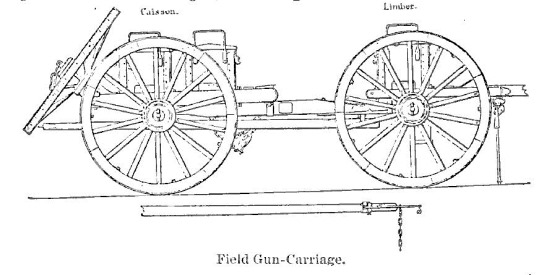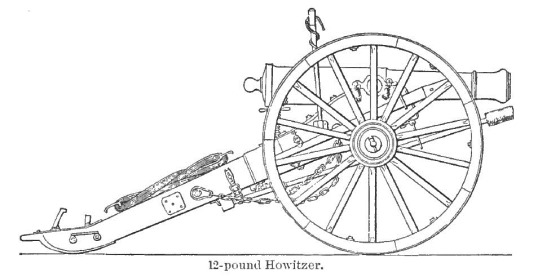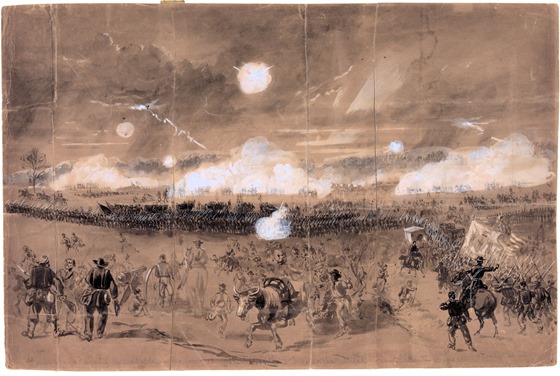May 3—We camped one mile from town. We left here on the 25th day of March, and returned May 2. Went through a campaign of twenty-seven days. In that time we had Washington besieged sixteen days. The balance of the time we were marching and counter-marching in all kinds of weather, and very often without anything to eat.
Friday, May 3, 2013
May 3. — The enemy evacuated the ford to-day, and General Benham laid one of the bridges. After he had done so, he received a telegram ordering him not to lay it. The other bridge was ordered to United States Ford, where it went with Colonel Colgate, and sixteen boats. General Sedgwick carried the heights behind Fredericksburg this morning, and made his way up as far as B.’s Ford, on the plank road. About 5.30 I went across the river, and saw his men attack the enemy posted near Salem Church. We were driven back. General Hooker telegraphed in the morning that he was driving the enemy, and that he only needed Sedgwick to make his victory complete.
May 3d.—Called up early, and off on the march. Received a mail to-day, which was a welcome visitor to many, as it is the first one for some time. May they come oftener, and to every soldier. One poor fellow, who did not receive a letter, declared his girl had grown tired of him, and probably taken a beau at home. Another sympathized with him in the disappointment, and offered to let him read the letter he had received from his girl, who was aiding and encouraging him with her prayers. Pursued the enemy through the day, and were at their heels all the time, and at evening caught sight of them crossing Hankinson’s Ferry, on Black Biver. We made a rapid charge upon them, firing as we ran, while DeGolier’s battery shelled them. Some few were shot while crossing the bridge. I suppose they have retreated to Vicksburg, as they are on a direct road to that place. After driving the enemy across the temporary bridge, we closed up business for the night, and sought our blankets.
Monday, 3rd. Moved on at 8 o’clock having waited for tents to dry off. Passed Catlett Station and reached Warrenton Junction at noon. Burnside’s Hdqrs. here. One Div. here. Passed one at Manassas, at Ferrero and one at Bristol. Drew hay for our feed, also oats for three days. Also 7 wagons. Kept quite busy. Didn’t get much sleep; ordered to march at 2 A. M. Cold—Tea—8 days of commissaries and 5 of forage.
by John Beauchamp Jones
MAY 3D.—We have no further news from the army, except the usual skirmishing. A number of our wounded arrived last evening. An officer reports that, from what he could see of the enemy’s conduct, the soldiers do not come to the point with alacrity. He thinks they fight with reluctance, and are liable to be routed any hour by inferior numbers.
Troops were sent up in special trains last night, and also this morning. These are some of the regiments which Gen. D. P. Hill had in North Carolina; and hence the complaints of Gov. Vance, that his State did not have its just proportion of the protection of the government. Of Longstreet’s movements, I am not advised. But there will be news enough in a few days.
The President’s health is still precarious, and he is still threatened with the loss of his remaining eye.
The Vice-President was in my office yesterday, and told me his health is quite as good as usual. One would suppose him to be afflicted with all manner of diseases, and doomed to speedy dissolution; but, then, he has worn this appearance during the last twenty years. His eyes are magnificent, and his mind is in the meridian of intellectual vigor.
There has been some commotion in the city this afternoon and evening, but no painful alarm, produced by intelligence that the enemy’s cavalry, that cut the road at Trevillian’s depot, had reached Ashland and destroyed the depot. Subsequent rumors brought them within eight miles of the city; and we have no force of any consequence here. The account was brought from Ashland by a Mr. Davis, who killed his horse in riding eighteen miles in one hour and a half.
Later in the day a young man, sixteen years old (Shelton), reached the city from Hanover on a United States horse, the [click to continue…]
Couch’s Corps forming line of battle in the fields at Chancellorsville to cover the retreat of the Eleventh Corps disgracefully running away.
Drawing by Alfred R. Waud, brown paper : pencil, Chinese white, and black ink wash ; 34.7 x 52.7 cm (sheet)
Inscribed on verso: Battle May 1-3, 1863 Chancellorsville, Va. 11; Corps … 26 Wisconsin; 25 Ohio; 82 Illinois; 55 Ohio; No II 2. MJB 32.
Library of Congress image.
May 3.—A force of Union troops, numbering about one thousand five hundred men, which left Nashville, Tenn., on the eleventh ultimo, under the command of Colonel A. D. Streight, on a raid into Alabama and Georgia, was this day captured in the vicinity of Gadsden, Ala., after successfully resisting the enemy in a series of skirmishes along his march, by a body of rebel troops, under the command of General Forrest— (Doc. 173.)
—The battle of Chancellorsville, Va., was renewed at daylight this morning, and, after severe fighting until noon, the Nationals were obliged to fall back from their position, when hostilities, in a great measure, ceased for the day.—(Doc. 183.)
—The Catholic Bishop of Iowa, in a sermon at Dubuque, pointedly denounced the Knights of the Golden Circle, stating that he would give the members of the church who had joined the organization, two weeks to leave it, and then, if they still continued in it, they might consider themselves excommunicated.—The British schooner Emma Amelia was captured at St. Andrew’s Bay, Fla., by the National bark Roebuck.—Grand Gulf, Miss., was abandoned at daylight this morning, the rebels blowing up the magazines and spiking their guns. Soon after the evacuation the place was entered by the National forces, under Admiral D. D. Porter.— (Doc. 184)
—A short fight occurred near Warrenton Junction, Va., between a party of General Stahel’s cavalry, under Colonel De Forest, and Mosby’s rebel guerrillas, resulting in the rout of the latter with great loss.—(Doc. 185.)
—The ship Sea Lark, in latitude 24° south, longitude 29° west, was captured and burned by the rebel privateer Alabama.
—Colonel Montgomery, in command of a detachment of negro troops, returned to Beaufort, S. C, after a three days’ raid up the Combahee River. During that time he encountered and dispersed several squads of rebel guerrillas, destroyed the town of Asheppo by fire, burned and otherwise destroyed property to the amount of two millions of dollars, belonging to rebel planters along the river, and captured nearly eight hundred slaves, all of whom he carried with him to Beaufort.










